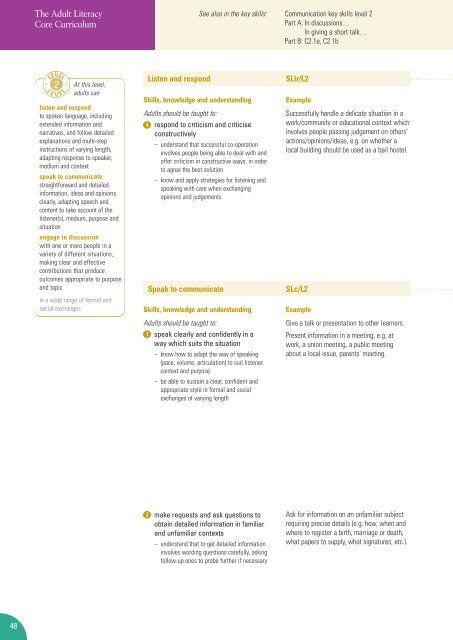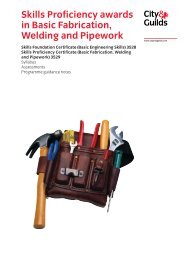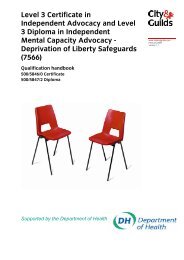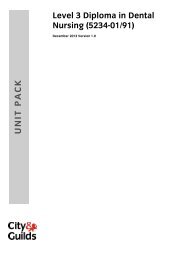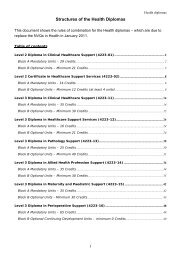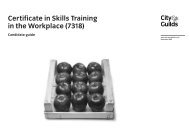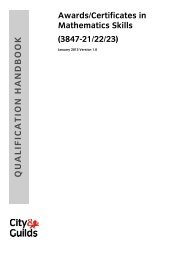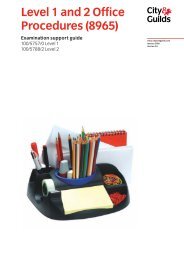Adult Literacy Core Curriculum - Nationally developed Skills for Life ...
Adult Literacy Core Curriculum - Nationally developed Skills for Life ...
Adult Literacy Core Curriculum - Nationally developed Skills for Life ...
You also want an ePaper? Increase the reach of your titles
YUMPU automatically turns print PDFs into web optimized ePapers that Google loves.
48<br />
The <strong>Adult</strong> <strong>Literacy</strong><br />
<strong>Core</strong> <strong>Curriculum</strong><br />
At this level,<br />
adults can<br />
listen and respond<br />
to spoken language, including<br />
extended in<strong>for</strong>mation and<br />
narratives, and follow detailed<br />
explanations and multi-step<br />
instructions of varying length,<br />
adapting response to speaker,<br />
medium and context<br />
speak to communicate<br />
straight<strong>for</strong>ward and detailed<br />
in<strong>for</strong>mation, ideas and opinions<br />
clearly, adapting speech and<br />
content to take account of the<br />
listener(s), medium, purpose and<br />
situation<br />
engage in discussion<br />
with one or more people in a<br />
variety of different situations,<br />
making clear and effective<br />
contributions that produce<br />
outcomes appropriate to purpose<br />
and topic<br />
in a wide range of <strong>for</strong>mal and<br />
social exchanges<br />
Listen and respond SLlr/L2<br />
<strong>Skills</strong>, knowledge and understanding<br />
<strong>Adult</strong>s should be taught to:<br />
4 respond to criticism and criticise<br />
constructively<br />
– understand that successful co-operation<br />
involves people being able to deal with and<br />
offer criticism in constructive ways, in order<br />
to agree the best solution<br />
– know and apply strategies <strong>for</strong> listening and<br />
speaking with care when exchanging<br />
opinions and judgements<br />
<strong>Skills</strong>, knowledge and understanding<br />
<strong>Adult</strong>s should be taught to:<br />
1 speak clearly and confidently in a<br />
way which suits the situation<br />
– know how to adapt the way of speaking<br />
(pace, volume, articulation) to suit listener,<br />
context and purpose<br />
– be able to sustain a clear, confident and<br />
appropriate style in <strong>for</strong>mal and social<br />
exchanges of varying length<br />
2<br />
See also in the key skills: Communication key skills level 2<br />
Part A: In discussions. . .<br />
In giving a short talk. . .<br />
Part B: C2.1a, C2.1b<br />
make requests and ask questions to<br />
obtain detailed in<strong>for</strong>mation in familiar<br />
and unfamiliar contexts<br />
– understand that to get detailed in<strong>for</strong>mation<br />
involves wording questions carefully, asking<br />
follow-up ones to probe further if necessary<br />
Example<br />
Speak to communicate SLc/L2<br />
Successfully handle a delicate situation in a<br />
work/community or educational context which<br />
involves people passing judgement on others’<br />
actions/opinions/ideas, e.g. on whether a<br />
local building should be used as a bail hostel.<br />
Example<br />
Give a talk or presentation to other learners.<br />
Present in<strong>for</strong>mation in a meeting, e.g. at<br />
work, a union meeting, a public meeting<br />
about a local issue, parents' meeting.<br />
Ask <strong>for</strong> in<strong>for</strong>mation on an unfamiliar subject<br />
requiring precise details (e.g. how, when and<br />
where to register a birth, marriage or death,<br />
what papers to supply, what signatures, etc.).


